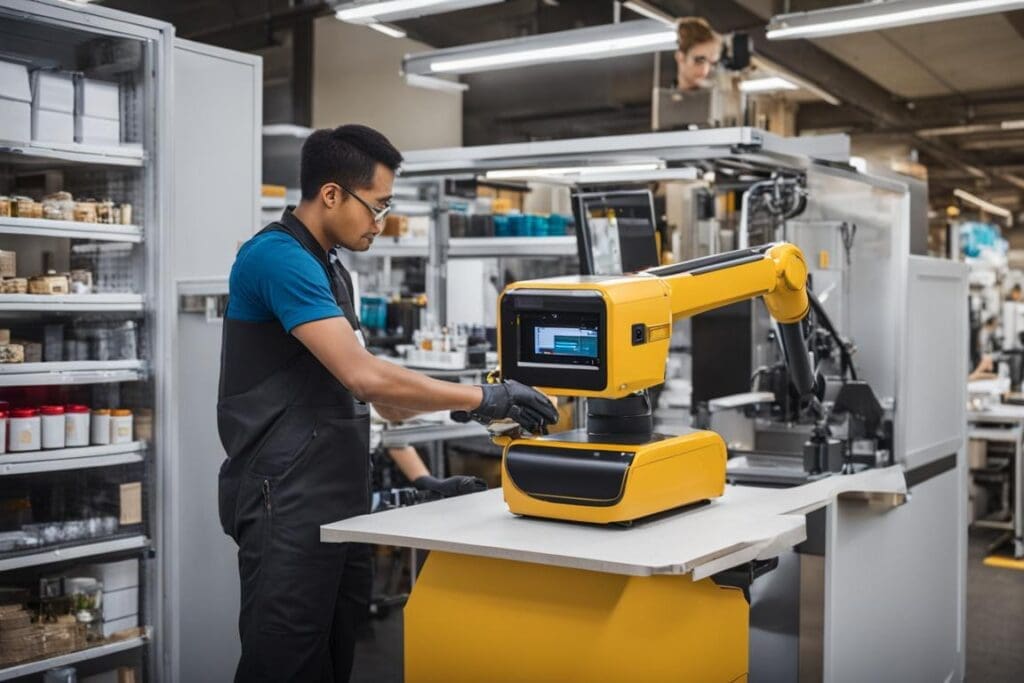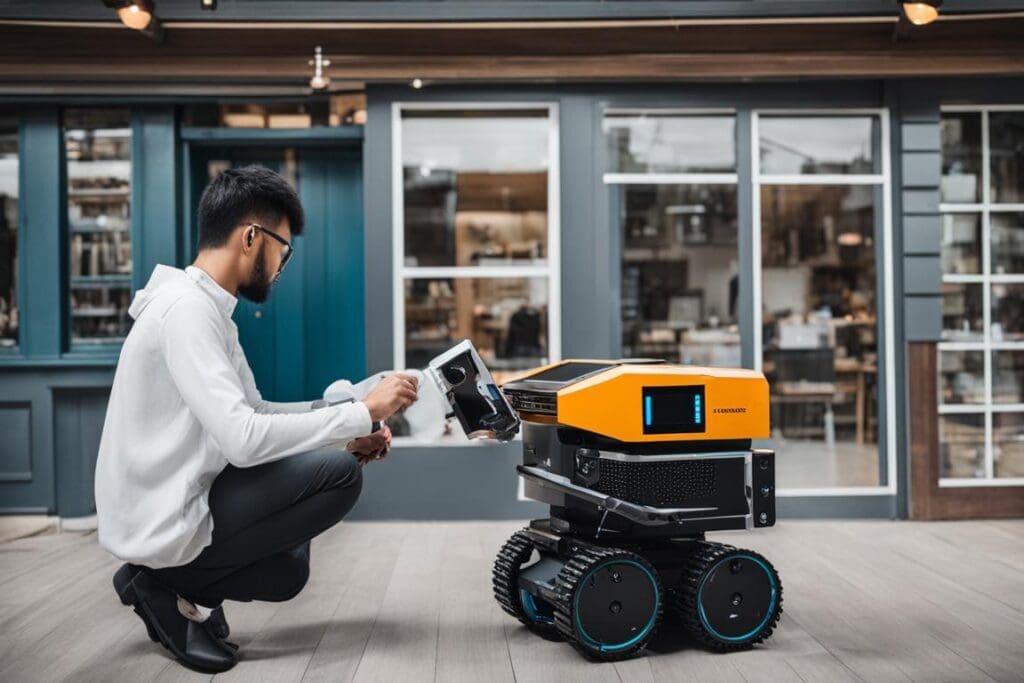Artificial Intelligence (AI) is transforming the way small businesses operate, revolutionizing their workflows and maximizing operational efficiency. With AI, small businesses can automate tasks, improve customer service, and gain a competitive edge in today’s fast-paced business landscape.
Local IT consultants are preparing small business clients for the impact of AI, recognizing its potential to drive growth and improve productivity. As an assistant, AI helps business owners accomplish tasks faster, providing invaluable support in various areas of their operations.
AI technology offers numerous benefits for small businesses. It can automate mundane tasks, freeing up time and resources for more important projects. By utilizing chatbots, AI improves customer service by handling inquiries and tasks simultaneously. Additionally, AI has applications in marketing, security, and robotics, further enhancing small businesses’ capabilities.
Key Takeaways:
- AI revolutionizes small businesses by automating tasks and improving efficiency.
- AI improves customer service through chatbots and multitasking capabilities.
- AI offers benefits in marketing, security, and robotics for small businesses.
- Small businesses can maximize efficiency by integrating AI into their operations.
- Utilizing AI technology helps small businesses gain a competitive edge.
The Benefits of AI for Small Businesses
AI technology offers a wide range of benefits for small businesses, revolutionizing their operations and enhancing their competitiveness in the market. By leveraging AI solutions, small businesses can automate tasks, improve customer service, and optimize their marketing strategies, ultimately leading to increased efficiency and profitability.
One of the key advantages of AI for small businesses is the automation of mundane tasks. AI-powered software can take over repetitive and time-consuming tasks, allowing employees to focus on more important projects. This not only saves time and resources but also helps improve overall productivity.
AI also plays a crucial role in enhancing customer service for small businesses. Chatbots powered by AI technologies can handle customer inquiries and tasks simultaneously, providing quick and personalized responses. This not only improves customer satisfaction but also frees up employees’ time to focus on more complex and value-added activities.
“AI technology offers a wide range of benefits for small businesses, revolutionizing their operations and enhancing their competitiveness in the market.”
In terms of marketing, AI enables small businesses to gain valuable insights into customer preferences and behaviors. By analyzing large amounts of data, AI tools can identify patterns and trends, enabling targeted marketing campaigns that resonate with customers. This helps small businesses attract and retain customers more effectively, ultimately driving business growth.
Moreover, AI has the potential to enhance the security of small businesses. AI-powered security systems can detect and prevent cyber threats, protecting sensitive business information. This allows small businesses to operate with confidence and safeguard their reputation in the marketplace.
In conclusion, the benefits of AI for small businesses are immense. From automating tasks and improving customer service to optimizing marketing strategies and enhancing security, AI technology offers numerous opportunities for small businesses to thrive in today’s competitive business landscape. By embracing AI solutions, small businesses can maximize efficiency, reduce costs, and gain a significant competitive edge.
Automation with AI Tools for Small Businesses
Implementing AI-powered automation tools can greatly benefit small businesses by streamlining operations and increasing efficiency. These tools can automate various tasks, such as customer service inquiries, bookkeeping, and marketing, freeing up precious time and energy for more important projects. Additionally, AI software is becoming more affordable and easier to integrate into small businesses, ensuring that they can keep up with larger corporations.
One popular AI tool for small businesses is robotic process automation (RPA). This technology allows businesses to automate repetitive tasks, eliminating the need for manual labor. By implementing RPA, small businesses can optimize processes and remove time-consuming and mundane tasks from their employees’ workload.
Another useful AI tool for small businesses is predictive analytics. This technology uses algorithms and data analysis to make predictions and forecast trends. By leveraging predictive analytics, small businesses can gain valuable insights into their customers’ preferences, behaviors, and purchasing patterns, enabling them to tailor their marketing strategies and offerings more effectively.
Artificial intelligence itself is a powerful tool for small businesses. It can analyze large amounts of data, provide data-driven insights, and automate complex tasks. Small businesses can integrate AI software to make faster and more accurate decisions, ensuring they stay competitive in today’s fast-paced business landscape.
| AI Tools for Small Businesses | Benefits |
|---|---|
| RPA (Robotic Process Automation) | Automates repetitive tasks, optimizes processes |
| Predictive Analytics | Provides insights into customer preferences, enables targeted marketing |
| Artificial Intelligence | Analyzes data, automates complex tasks, enables faster decision-making |
The Benefits of Automating Small Business Operations
Automating operations with AI tools offers several advantages for small businesses. Firstly, it allows for increased productivity and efficiency by eliminating time-consuming manual tasks. This enables small business owners and employees to focus on more strategic and revenue-generating activities.
Secondly, automation helps improve customer service by reducing response times and providing consistent and accurate information. AI-powered chatbots, for instance, can handle customer inquiries and provide support 24/7, ensuring prompt and efficient service even outside of regular business hours.
Lastly, AI tools can enhance decision-making by providing data-driven insights. By analyzing large datasets, businesses can identify trends, patterns, and opportunities that may have otherwise gone unnoticed. This allows small businesses to make informed decisions and stay ahead of the competition.
AI and Efficiency in Small Businesses
AI technology is becoming increasingly prevalent in small businesses, offering significant potential to improve operational efficiency and streamline processes. By leveraging AI applications, small businesses can automate tasks, optimize supply chains, and gain valuable insights for decision-making. With the ability to handle customer service inquiries, analyze data, and forecast demand accurately, AI can help small businesses maximize efficiency and stay competitive in today’s rapidly evolving business landscape.
One of the key benefits of AI in small businesses is its ability to automate customer service tasks. By implementing chatbots and virtual assistants, businesses can provide instant responses to customer inquiries, freeing up employees’ time for more important tasks. AI can also analyze large amounts of data, enabling businesses to gain insights into customer behaviors and preferences. These insights can be used to inform targeted marketing campaigns and personalized experiences, ultimately driving business growth.
Furthermore, AI technology can optimize supply chains in small businesses by automating inventory management and forecasting. By accurately predicting demand, businesses can reduce inventory costs and ensure they have the right products available at the right time. AI-powered predictive analytics can also identify patterns and trends in customer behavior, allowing businesses to make data-driven decisions and stay ahead of the competition.
The Role of AI in Small Business Efficiency
AI applications offer small businesses the opportunity to increase efficiency in various areas. For instance, AI-powered tools can automate repetitive tasks like data entry and document processing, allowing employees to focus on more strategic initiatives. Additionally, AI can identify patterns and anomalies in data, enabling businesses to detect fraud and security breaches more efficiently. By implementing AI technology, small businesses can streamline operations, reduce costs, and improve overall efficiency.
| Benefit | Explanation |
|---|---|
| Automated Customer Service | AI-powered chatbots and virtual assistants can handle customer inquiries, providing instant responses and freeing up employees’ time. |
| Data Analysis and Insights | AI can analyze large amounts of data, allowing businesses to gain valuable insights into customer behaviors and preferences. |
| Optimized Supply Chains | By accurately predicting demand and automating inventory management, AI can optimize supply chains and reduce costs. |
| Automated Tasks | AI can automate repetitive tasks like data entry and document processing, freeing up employees’ time for more strategic initiatives. |
| Fraud Detection and Security | AI can identify patterns and anomalies in data, enabling businesses to detect fraud and security breaches more efficiently. |
In summary, AI technology presents significant opportunities for small businesses to improve efficiency and drive growth. By leveraging AI applications, businesses can automate customer service, analyze data for insights, optimize supply chains, and streamline operations. The implementation of AI technology can ultimately lead to cost savings, enhanced customer experiences, and increased competitiveness in the market.
Image source: https://seo-writing.ai/32_6.png
AI and Profitability in Small Businesses
Implementing AI strategies can have a significant impact on the profitability of small businesses. By leveraging AI technology, small businesses can streamline operations, reduce costs, and increase revenue. Let’s explore how AI can drive profitability in small businesses.
The Benefits of AI in Cost Reduction
One of the key ways AI improves profitability is through cost reduction. AI-powered automation tools can replace manual labor, eliminating the need for human intervention in repetitive tasks. This not only saves time but also reduces labor costs.
According to a recent study, small businesses that implemented AI solutions experienced an average cost reduction of 11.4%. This significant reduction in costs directly contributes to increased profitability.
AI can also optimize supply chains and inventory management. By analyzing data and forecasting demand accurately, small businesses can avoid overstocking or understocking, minimizing inventory costs and maximizing profitability.
Enhancing Customer Experience and Retention
AI technology can help small businesses improve customer experience and retention, leading to increased profitability. AI-powered chatbots and virtual assistants can handle customer inquiries and provide personalized recommendations, ensuring round-the-clock support and enhancing customer satisfaction.
By analyzing big data, AI can also uncover valuable insights into customer behavior and preferences. This enables small businesses to tailor their products, services, and marketing strategies to specific customer segments, effectively increasing customer retention and loyalty.
Data-Driven Decision Making
AI empowers small businesses to make data-driven decisions, which can significantly impact profitability. By leveraging AI analytics tools, small businesses can analyze vast amounts of data quickly and accurately, uncovering trends, patterns, and opportunities for growth.
These data-driven insights enable small businesses to make informed decisions on pricing, marketing strategies, and product development. By aligning their strategies with customer needs and market trends, small businesses can drive profitability and gain a competitive edge.
| AI Strategies | Impact on Profitability |
|---|---|
| Automation of repetitive tasks | Saves time and reduces labor costs |
| Optimization of supply chains | Minimizes inventory costs |
| Enhanced customer experience | Increases customer satisfaction and retention |
| Data-driven decision making | Aligns strategies with customer needs |
AI Implementation in Small Businesses
Implementing AI technology in small businesses can bring numerous benefits and improve operational efficiency. By utilizing AI tools and software, small businesses can automate tasks, gain data-driven insights, and make faster and more accurate decisions. AI implementation doesn’t have to be complicated; there are various AI solutions available that are specifically designed for small businesses.
One example of AI implementation is the use of automation solutions. These tools can automate repetitive tasks, freeing up valuable time for employees to focus on more critical projects. Automation can streamline customer service inquiries, bookkeeping, and marketing, resulting in improved productivity and cost savings. By integrating AI through robotic process automation (RPA) and workflow automation, small businesses can optimize their processes and remove manual, time-consuming tasks.
Predictive analytics is another AI tool that can benefit small businesses. By analyzing large amounts of data, predictive analytics can provide valuable insights into customer behavior, market trends, and demand forecasting. This information allows small businesses to make data-driven decisions, develop targeted marketing strategies, and optimize their supply chain to reduce costs and improve efficiency.
| AI Implementation Benefits for Small Businesses | Examples |
|---|---|
| Automate repetitive tasks | Robotic process automation (RPA) |
| Gain data-driven insights | Predictive analytics |
| Improve customer service | Chatbots for handling inquiries |
| Optimize processes | Workflow automation |
Furthermore, small businesses can leverage AI technology for improved customer service. Chatbots, for example, can handle customer inquiries and provide real-time assistance, ensuring prompt and efficient support. This not only enhances the overall customer experience but also reduces the workload for customer service representatives.
Implementing AI in small businesses is a strategic move that can lead to increased efficiency, cost reduction, and competitive advantage. By embracing AI technology and utilizing AI tools, small businesses can streamline their operations, improve customer satisfaction, and drive growth. The key is to identify the specific AI solutions that align with the business’s unique needs and goals and to ensure proper integration and training for employees to fully harness the potential of AI.
AI and Cost Reduction in Small Businesses
Implementing AI in small businesses can lead to significant cost reductions and improved efficiency. By leveraging AI solutions, small businesses can streamline operations, automate tasks, and optimize processes, ultimately saving time and resources. According to a survey, 89% of small businesses saw an average cost reduction of 11.4% with AI implementation.
One of the primary ways AI helps reduce costs is through automation. AI-powered tools like robotic process automation (RPA) can handle repetitive tasks, eliminating the need for manual labor. This not only increases efficiency but also reduces labor costs and minimizes errors. By automating processes such as customer service inquiries, bookkeeping, and marketing, small businesses can free up their employees’ time for more important projects.
Additionally, AI tools can analyze large amounts of data and provide valuable insights for decision-making. By understanding customer behavior and preferences, small businesses can adjust their strategies and offer personalized experiences. This targeted approach can result in cost-effective marketing campaigns and improved customer satisfaction.
Furthermore, AI can optimize supply chains and forecast demand accurately. By analyzing data on inventory levels, AI tools can help small businesses reduce costs associated with overstocking or stockouts. This enables better inventory management and cost control, leading to increased profitability.
| AI Solutions for Cost Reduction in Small Businesses |
|---|
| Robotic Process Automation (RPA) |
| Predictive Analytics Tools |
| Workflow Automation |
| Data Analysis and Insights |
In conclusion, AI provides small businesses with powerful solutions for cost reduction and improved efficiency. By implementing AI tools and technologies, small businesses can automate tasks, optimize processes, and make data-driven decisions. This not only leads to cost savings but also enhances competitiveness and opens up opportunities for growth. Small businesses that embrace AI can stay ahead in today’s rapidly evolving business landscape, maximize their resources, and drive sustainable success.
The Future of AI for Small Businesses
As small businesses continue to navigate the rapidly evolving business landscape, the role of AI technology becomes increasingly important. With its ability to automate processes and drive efficiency, AI offers small businesses the opportunity to stay competitive and thrive in the future. The potential for small business automation through AI is vast, promising improved operations and increased profitability.
AI technology for small businesses is constantly advancing and evolving. As AI software applications become more sophisticated and affordable, small businesses can benefit from their implementation. Automation solutions, predictive analytics tools, and artificial intelligence software can streamline operations, provide valuable insights, and perform complex tasks. With AI-powered robotic process automation (RPA) and workflow automation, small businesses can optimize processes and remove repetitive tasks.
By embracing AI technology, small businesses can unlock numerous benefits and opportunities for growth. AI-powered automation tools not only enhance efficiency but also improve customer service. Through AI chatbots, small businesses can provide round-the-clock assistance to customers, handling inquiries and tasks simultaneously. AI can also offer valuable insights into customer preferences and behaviors, allowing small businesses to tailor their marketing strategies effectively.
The Impact of AI on Small Business Efficiency
“AI-powered automation tools not only enhance efficiency but also improve customer service.”
The future of AI for small businesses is exciting. As AI technology continues to evolve, small businesses will have access to even more efficient and effective solutions for their operations. Automation will become increasingly prevalent, enabling small businesses to automate various tasks and streamline their operations. By embracing AI and leveraging its potential, small businesses can position themselves for success and drive growth in the ever-changing business landscape.
The Advantages of AI for Small Business Automation
| Benefits of AI for Small Businesses | Examples |
|---|---|
| Automation of Mundane Tasks | Automated customer service inquiries, bookkeeping, and marketing |
| Improved Customer Service | AI chatbots providing round-the-clock assistance |
| Enhanced Marketing Strategies | AI-powered insights into customer preferences and behaviors |
| Optimized Operations | AI-enabled process optimization and workflow automation |
| Increased Efficiency | Time and resource savings through automation |
Conclusion
Artificial Intelligence (AI) has emerged as a powerful tool for small businesses, offering unlimited potential to maximize efficiency and drive growth. By embracing AI technology and implementing AI solutions, small businesses can revolutionize their operations and stay competitive in today’s rapidly evolving business landscape.
AI enables small businesses to automate tedious tasks, freeing up valuable time and resources for more important projects. With AI-powered chatbots, small businesses can enhance customer service by handling inquiries and tasks simultaneously, leading to improved customer satisfaction.
In addition to customer service, AI offers several other benefits for small businesses. It can provide valuable insights into customer preferences and behaviors, allowing for targeted marketing campaigns and personalized experiences. AI can also optimize processes, forecast demand accurately, and reduce costs, contributing to improved profitability.
To thrive in the future, small businesses must embrace AI. By integrating AI technology into their operations, small businesses can unlock numerous opportunities for efficiency, growth, and success. AI is not just a trend; it is a valuable tool that small businesses can leverage to gain a competitive edge in the market.
FAQ
How can AI benefit small businesses?
AI can benefit small businesses by automating tasks, improving customer service, enhancing marketing strategies, boosting security, and optimizing machinery and equipment.
What tasks can AI automate in small businesses?
AI can automate tasks such as customer service inquiries, bookkeeping, marketing, and other repetitive tasks, freeing up time for more important projects.
How can small businesses implement AI?
Small businesses can implement AI by using various AI software applications such as automation solutions, predictive analytics tools, and artificial intelligence tools.
Can AI help small businesses reduce costs?
Yes, AI can help small businesses reduce costs by automating processes, eliminating the need for manual labor, and optimizing supply chains and forecasting demand accurately.
What is the future of AI for small businesses?
The future of AI for small businesses is promising, with AI technology evolving to provide more efficient and effective solutions for their operations, ultimately driving growth and success.





